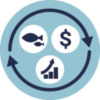FISHERIES MANAGEMENT CONSULTING
The OLSPS Marine Fisheries Management Consulting Division specialises in the design, development and implementation of sophisticated quantitative tools in fisheries science and management.
The team has vast experience in conducting logistically-complex field operations all around the world, involving the collection of ecological, economic and social primary data for use in advanced analyses.
OLSPS Marine adheres to strict timetables and deadlines in accordance with the needs and realities of the fishing industry.
The Fisheries Management Consulting Division’s field of expertise comprises:

Stock Assessment

Bio-economic Appraisals

Development of Fisheries Databases

Preparation of fishing gear studies

Experimental field studies and stock surveys

Forecasting and predictive model optimisation
FISHERIES STOCK ASSESSMENTS
Stock assessments are tools used by fisheries managers to aid them in making decisions related to the management of a specific fishery, or multiple fisheries. Stock assessments are used to determine the number of fish comprising a stock and how it has changed over time. Changes in the fish stock may lead to the fisheries manager responding with a range of management measures to ensure the objectives of the fishery are met. If an assessment indicates that a stock is being overexploited, managers can set control measures such as limiting the number or size of fish being caught, as well as closing the fishery during certain times.
The OLSPS Marine team has expertise in all modern quantitative stock assessment tools:

Bayesian assessments

Surplus production modelling

Size based mathematical models

Age structured production models

Mark-recapture based assessment procedures

Multivariate statistical analysis
Bayesian Stock Assessments
Surplus production modelling for fish stock assessment
Mark-recapture based assessment procedures
Surplus production modelling for fish stock assessment Mark-recapture based assessment procedures Bayesian stock assessments are rigorous statistical methods used to aid fisheries managers in making decisions by accounting for uncertainty in the model.
OLSPS Marine successfully developed a Bayesian Stock Assessment for the Chokka Squid (Loligo vulgaris reynaudii) on behalf of the South African Squid Management Association.
The OLSPS Marine team applies Surplus Production Models to determine the optimum level of effort that produces the maximum yield that can be sustained without affecting the long-term productivity of the stock, the called the maximum sustainable yield (MSY).
OLSPS Marine has successfully done Surplus Production Modelling for the Australian Fisheries Management Authority (AFMA) by producing a simulation investigation of the biological and economic risk of the draft harvesting strategy for small pelagics.
OLSPS Marine designed and implemented a large-scale tag-recapture experiment for both the West Coast Rock Lobster Fishery and the South Coast Rock Lobster Fishery to estimate levels of discard mortality, and further designed and developed a specialised software tool to analyse tag-recapture data and estimate annual growth increments by area in the fisheries. This tool is still one of the major inputs into the management for these two resources.
BIO-ECONOMIC APPRAISALS
Bio-economic appraisals are well informed and take into consideration ecological, social and economic indicators to provide our clients with in-depth evidence-based solutions to managing fisheries.
The OLSPS Marine team of specialists have expertise in bio-economic appraisals of fisheries in context to the scientific paradigms underlying fisheries management.
Bio-economic appraisals have been undertaken for the South African Hake Trawl Fishery on behalf of the Marine Stewardship Council, Sustainable Fisheries of Senegal (ADUPES) on behalf of the European Union, as well as part of the West Africa Regional Fisheries Project (WARFP) on behalf of the World Bank.
FISHERIES SPATIAL ANALYSIS
The OLSPS Marine team has conducted spatial analysis of fishery catch effort data, using geographic information systems (GIS). Depending on the objective, the tools are designed to facilitate the understanding of spatial and temporal activity of fishers, leading to the identification of “hot spots”, “high vs low seasonal pattern” and catch composition.
These solutions comprise interactive tools which integrates data from MS Excel and Access to filter and spatially display the distribution of catch-effort and sampled data for the respective fishery.
Fisheries spatial analysis tools have been developed for both the South African Deep-Sea Trawling Industry Association and the South African South Coast Rock Lobster Association.
